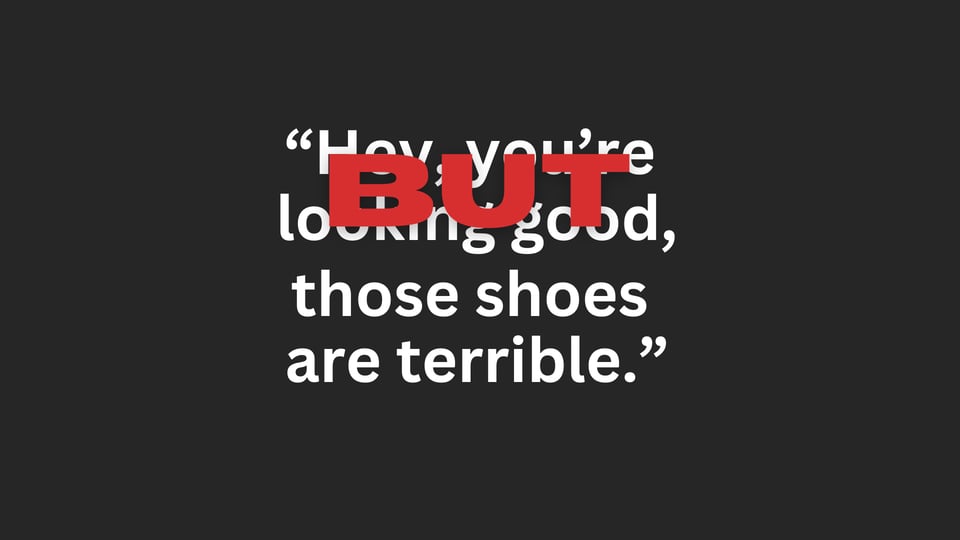No “buts” about it
Let’s talk about the joys (and occasional horrors) of creativity and making stuff.

So, two friends meet for lunch. Let’s call them Josh and Vera (because their real names are Aloysius and Hortensia, and that’s just too much to type).
Anyways, Vera gets to the restaurant first (that’s so Vera), and when Josh arrives, she looks up and says, “Hey, you’re looking good — but those shoes are terrible.”
So what is Josh thinking now?
Vera thinks he looks good?
Vera thinks he looks good AND the shoes look bad?
Vera thinks he looks bad BECAUSE of the shoes?
While Josh reads the menu to gather his thoughts, here’s a quick updates.
What’s going on?
I know a lot of you originally signed up to this newsletter via The Four Weeks of Halloween podcast. So I’m sorry to tell you we probably won’t be doing it again this year. So much stuff happening in October!
That said, I have a hard time leaving Halloween alone. So maybe we’ll do a one-off? Danny actually has a new raven friend, so they might put something together. So if there is anything you need to see or hear from (required field) Productions and/or Danny this Halloween, let us know. Maybe you can be the shoulder devil that gets us to set something up for Spooky Season.
Something that occurred to me while making stuff
OK, so Josh just got a weird, multi-lobed comment from Vera. There’s a lot of ways he can take it. And odds are, he’s thinking option #3, that Vera thinks he actually looks bad, despite what she said at the start of her comment.
But why? Vera clearly said that he looked good. Sure, she doesn’t like the shoes, but that was an entirely different thought. She said he looked good first. So how did the negative comment end up overpowering the positive?
Behold “But,” Destroyer of Clauses
Look up “but” in the dictionary, and it has all sorts of definitions. It’s a conjunction! It’s a preposition! An adverb! A noun! A dessert topping! A floor wax!
We use it all the time to separate two different or contradictory ideas. This but not that. And in theory it should work in Vera’s “compliment.” But (and I use the word advisedly here) what we feel when we hear that word is:
Ignore everything I said before I said “but”
I forget where I first saw this secret meaning exposed, because I would really like to credit whoever described it. It really stuck with me. “But” can scrub away the meaning of the first part of the sentence. And if I don’t want the first part of the sentence to be remembered, then why write it in the first place. What if I just said what I mean?
So I decided to remove “but” from my vocabulary. (Along with other qualifiers and obscurants like although, however, nevertheless, on the other hand, still, though, yet, etc.)
It wasn’t easy. Then, I found a substitute. And it changed how I write — and think.
“And” for the win
Yes, “and.” Such a wonderful word. Literally inclusive. The basis of an entire genre of comedy. And it’s a useful replacement for “but.”
Whenever I think about saying or writing something using the word “but,” I replace it with “and.” If the two thoughts on either side of the “but” still work together as a single coherent thought, I keep it. If the “and” shows it’s really two thoughts, then I separate each into their own sentence.
Let’s test this. Suppose Vera had said, “You look good and those shoes are terrible.”
That’s really not a single thought, is it? It’s two, and they clash. So she probably means to say two separate things. And they probably should be said at two different times. Which one should be said when? When’s the right time, the right context?
Late night TV to the rescue:
Craig Ferguson’s Three Questions
In the wise words of my favorite late night host, Craig Ferguson:
The three things you must always ask before you say anything:
Does this need to be said?
Does this need to be said by me?
Does this need to be said by me NOW?
A lot of times when I separate two thoughts connected by “but,” one of them fails this test. So I jettison it. The other thought is more important.
If you want to compliment somebody, just compliment them. Let the compliment live and breathe for awhile. You diminish it if you qualify it.
If somebody is trailing toilet paper from their shoe, tell them right away. It “needs to be said by you now.”
In communication, as in comedy, it’s all about timing. And it’s time for links!
Fun links to know and share
John Peralta Explodes Historic Technology into Three-Dimensional Diagrams So beautiful. Such want. Wow.
Kinetic installations by Zimoun I fell deep into this rabbit hole. Sure some of these artworks are full-on WTF, but I guarantee you’ll find at least a couple of ‘em fascinating.
Teenagers are using AI to learn math and science from celebrities “As with any emerging technology, watching how younger people actually use it is one of the best predictors of where it might go.”
How to monetize a blog Hilarious, informative, horrifying.
Octopuses and fish caught on camera hunting as a team Seriously, if octopi lived longer than 1-2 years, we’d be negotiating with cephalopod societies for ocean access.
Over to you
In addition to everyday communication, I have found the exercise of removing “but” useful in technical and marketing materials, where urgency reigns and clarity counts.
And it isn’t a not hard and fast rules (let’s face it, nothing in the English language ever is). You can pepper every sentence with “but,” and still say what you mean. I don’t treat this as a complete embargo on the word, I just think it needs to earn its place in my writing. When I see it, I try to figure if there is a better, clearer, shorter alternative.
I’m curious—do you have any personal rules or habits you use to make sure you’re communicating clearly? Let me know in the comments.
Until we talk again, I remain,
Your pal,
Jamie
P.S. My dream office setup:

Add a comment: